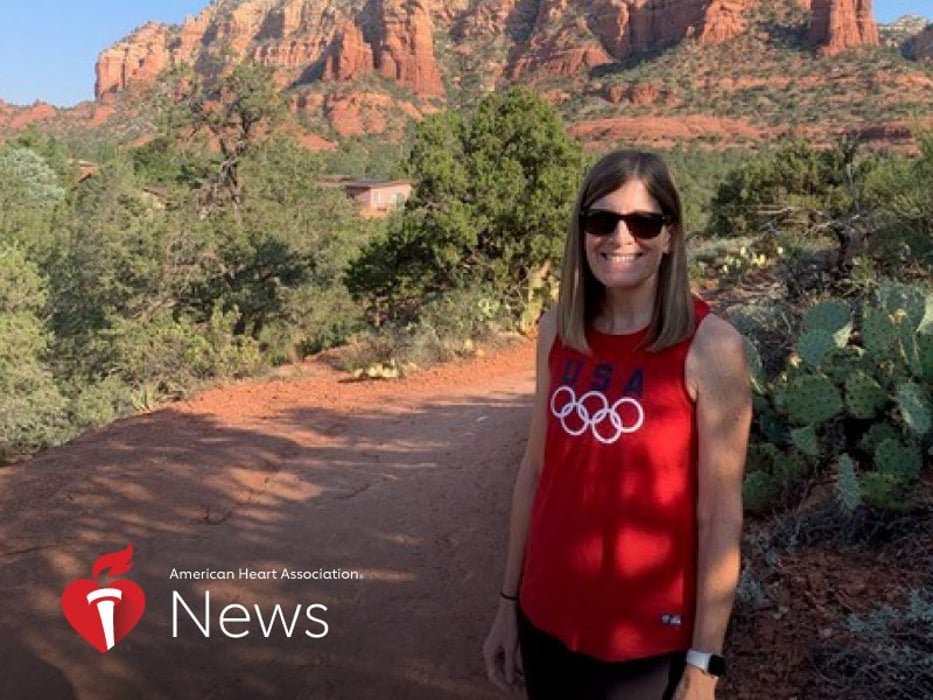AHA News: She Boarded a Cruise Ship. Then She Had a Stroke.

TUESDAY, April 11, 2023 (American Heart Association News) -- Shelley Davis packed shorts, bathing suits and sunscreen for a weeklong cruise with her husband, Greg, and their 13- and 15-year-old daughters.
The morning before boarding the ship in Port Canaveral, Florida, the family from Mesa, Arizona, soaked up the sunshine and played in an arcade. When it came time to board the bus for the cruise terminal, Shelley had a headache. Once on board the ship, she headed straight to her stateroom for a nap.
"I took the girls out to look around the ship and when we went back to the room, Shelley was really ill," Greg said.
She joined her family on the main deck for a life jacket drill. Greg planned to find a nurse once the demonstration was complete. However, he noticed that when he asked her questions, she answered with only yes or no.
Sensing something was off, he asked, "Do you know what your name is?"
"Yes," she said.
"Tell me your name," Greg said.
Shelley just looked at him. He immediately went for help.
Shipboard medics took Shelley to the infirmary. An exam determined she needed advanced medical care. Fortunately, the ship was still docked. An ambulance was called and Shelley was transported to the nearest hospital.
By the time she reached the emergency room, the right side of her face was drooping and she couldn't move her right side. Even though Shelley worked as an occupational therapist helping stroke survivors during their recovery, the then-46-year-old never considered that she was having a stroke. Further examination revealed that the cause was a carotid artery dissection, when the layers of the carotid artery in the neck separate, and blood flow to the brain is compromised. Shelley had 100% blockage of blood flow.
She was airlifted to a nearby trauma hospital. Doctors gave her a 20% chance of survival.
"When we saw her in the hospital, the reality set in that this was a life-or-death situation," Greg said.
Shelley had emergency surgery to restore blood flow to her brain. The stroke was attributed to fibromuscular dysplasia, a rare disease that causes medium-sized arteries to narrow, blocking blood flow and possibly leading to aneurysms.
Instead of spending a week cruising between Caribbean islands and enjoying shipboard activities, Shelley was in the intensive care unit. But she knew she was lucky to be alive.
"I remember waking up and I could move my right arm slightly, and I knew that was a really good sign for recovery," she said. "I was so grateful that it happened when it did and not hours later when we were out to sea."
Surgery was just the first step in a long recovery process.
Shelley returned home to Arizona and received months of outpatient therapy. Even though she was able to regain strength in her right side, speech remained a challenge. She relied on her family to help her communicate.
"It was very frustrating when the phone would ring at home," she said. "I couldn't answer it because I couldn't communicate. Or when I had the strength to go grocery shopping, I couldn't go to the deli and tell them what I wanted. It motivated me to do another set of reps for speech exercises."
Three years after her stroke, which happened in 2015, Shelley returned to work, helping stroke survivors relearn how to do everyday activities. She tells them about her own experience to help motivate them.
"My patients get so frustrated because they want to be totally recovered as fast as possible, but I know from being in that situation that you have to take it a day at a time, a week at a time," she said. "Every year, I'm still progressing with speech and strength. It's nice to have that unique perspective of being a health care provider and a stroke survivor because I can empathize and show them that recovery is possible."
American Heart Association News covers heart and brain health. Not all views expressed in this story reflect the official position of the American Heart Association. Copyright is owned or held by the American Heart Association, Inc., and all rights are reserved.
By Jodi Helmer, American Heart Association News
Related Posts
NOAC Use Not Tied to ICH in Stroke Patients Treated With Alteplase
FRIDAY, Feb. 25, 2022 (HealthDay News) -- For patients with acute ischemic...
Nearly 400 Crashes Tied to Self-Driving, Driver-Assist Technologies Since Last Summer
WEDNESDAY, June 15, 2022 (HealthDay News) -- Nearly 400 crashes have been tied...
Ductal Carcinoma in Situ (DCIS): What It Is, Causes, Symptoms & Treatment
A breast cancer diagnosis can be terrifying, but one type of early-stage disease...
Rare Coding Variants May Influence Cognition in Schizophrenia
FRIDAY, Oct. 21, 2022 (HealthDay News) -- Ultrarare constrained variants (URCVs)...
